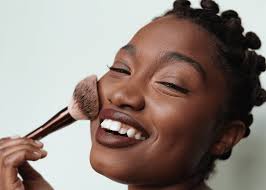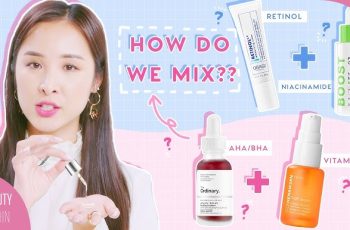Are dirty makeup brushes really bad for your skin?
Applying makeup can be a mindless and even self-indulgent task. You organize your makeup bag, thinking maybe you can apply a few products here or there today. But what about your makeup brushes and how to care for them? It’s easy to forget about this completely.
You probably won’t notice how dirty your brushes have become until they’re no longer so good, and unfortunately, by then, they’re too gross to be safe. We spoke to two dermatologists about the dangers of dirty makeup brushes and the effects they can have on your skin. We’re sure that after reading this article, you’ll be cleaning them more often.
Worrying about dirty makeup brushes
Unfortunately, dirty makeup brushes can do more than just hold some product. “I can’t stress enough how important keeping your makeup brushes clean is to keeping your skin healthy,” says Dr. Hannah Kopelman, a board-certified dermatologist and host of the Derm Club podcast. “Makeup brushes provide a fertile breeding ground for bacteria, from sources ranging from your skin to the environment around you,” explains Dr. Donald B. Yoo is a board-certified facial plastic surgeon and the medical director of HALO Beverly Hills Plastic Surgery and MedSpa.
He tells us, “Everything from common skin flora like Staphylococcus aureus and Streptococcus to intestinal bacteria like E. coli, faucet and hot tub bacteria like Pseudomonas, and even fungi can get onto makeup brushes and multiply quickly.”
Once these bacteria are there, they continue to grow. “It’s shocking how easily these microbes can multiply on brushes, especially when they’re stored in a humid environment or used frequently without cleaning,” explains Kopelman.
Common Skin Problems Caused by Dirty Makeup Brushes
Acne
It should come as no surprise to anyone that nasty organisms on brushes can transfer to your skin with continued use. “The transfer of bacteria, oils, and other residue from dirty makeup brushes can promote the clogging of pores and sebaceous ducts and exacerbate the inflammatory process that leads to acne breakouts,” says Yoo. Kopelman notes that “the combination of oils, dead skin cells, and bacteria on brushes creates the perfect environment for acne bacteria to thrive,” adding that “this is particularly concerning for patients with sensitive or acne-prone skin — using dirty brushes can make these conditions worse.”
General irritation
You may have noticed that dirty makeup brushes feel different on your skin than clean ones. “I’ve also noticed that dirty brushes not only contribute to acne, but they can also be extremely irritating to the skin,” Kopelman tells us. That’s because “sebaceous glands are located along follicles throughout the skin and secrete sebum as a protective barrier to keep the skin hydrated and soft,” Yoo says. Dirty makeup brushes clog the sebaceous ducts, which interrupts the process of sebum secretion, leading to inflammation and skin damage, which gets worse the longer you leave it alone.” “Over time, I’ve found that using dirty brushes weakens the skin’s natural barrier, making it more susceptible to irritation and infection,” Kopelman says.
How Often Should You Clean Your Makeup Brushes?
Now you might be worried that cleaning your brushes often isn’t enough. If you’re like most people, that’s totally true. Both experts agree that you should clean your makeup brushes once a week. “Regular cleaning is key to preventing skin issues and ensuring your brushes work as they should,” Kopelman says, noting that “when my patients keep their brushes clean, they tell me their makeup is improving. It can be applied more evenly and smoothly, which makes a big difference in the overall look.”
Cleaning them will also make them last longer. “Cleaning your brushes has a positive impact on their function,” Kopelman says. “It keeps the bristles soft and flexible, which is essential for proper makeup application.” She adds a word of caution, though. “I always advise my patients to clean them carefully. If the bristles are deformed by improper cleaning or drying, it will affect their performance.” To clean your brushes, Yoo recommends using warm water and baby shampoo, then laying them flat to dry to increase their longevity and function.
When should you throw away your brush or sponge?
No matter how well you care for your brushes (and we hope you’re more motivated to do so now), they won’t last forever. “Regular cleaning will extend their life, but if a brush stops working, I think it’s best to invest in a new one,” Kopelman says. “If, despite cleaning, excess residue remains or the bristles have lost their original flexibility and shape, you should throw your makeup brushes away,” advises Yoo. Kopelman advises “paying attention to the condition of your brushes. If you notice that the bristles are frayed, falling out, or losing their shape, it’s time to replace them.”
Conclusion
Dirty makeup brushes can be harmful to your skin. They can harbor everything from E. coli to fungi, picking up bacteria and flora from their environment and the skin itself. In turn, they can cause acne, irritate, and weaken the skin’s natural barrier. Fortunately, this is easy to avoid. You only need to clean them once a week. Clean brushes work better and last longer. At some point, they need to be replaced with a good, affordable brush set, but the better you take care of them, the better it will be in the long run.
DQH Knowledge drop: In your 20s, your skin cell turnover decreases. (Cell turnover is a key component in keeping your skin youthful.) You know what else slows down? Your collagen production. Starting in your 20s, collagen decreases by about 1 percent per year. Should you want to prevent fine lines and wrinkles, start by eliminating behaviors that contribute to premature aging. “If it’s bad for you, it’s bad for your skin,” says dermatologist Michel Somenek.
“Cigarette smoking reduces blood flow to the skin and causes premature wrinkling and a dull skin texture. Making the repeated pursed motion to inhale can also cause smoker’s lines. Alcohol and recreational drugs are toxins for the skin that damage its cellular structure and DNA,” Somenek tells us. “The faster you eliminate vices while you are young, the better chance your skin and body have to recuperate.” Also, adopting an anti-aging routine in your 20s is key. After all, the best offense is a good defense. We spoke to Somenek and experts Joshua Ross and Audrey Kunin to find out more.
Keep reading for the best anti-aging products for your 20s, according to skincare professionals.
Sunscreen
“We all know that the sun is the number one cause of skin aging and starting the prevention in your 20s is very important,” Ross says. “The majority of your sun damage won’t start to appear until you’re in your 30s, so don’t wait until you see it surface or you’ll be behind the curve. Stay ahead of it with a good-quality zinc-based sunscreen worn daily.”
Farmacy Green Defense Daily Mineral Sunscreen
An invisible sunscreen with SPF 30, plus botanical extracts meant to protect skin with tons of antioxidants. Bonus: It’s clean and fine to use under makeup.
Bareminerals Complexion Rescue™ Tinted Moisturizer Broad Spectrum SPF 30
Although we recommend you use your SPF and moisturizer separately, we also understand moments when you don’t have time or energy for that extra step. For those times, this bareMinerals moisturizer is a great thing to have on hand.
Vitamin C Serum
“A great introduction to anti-aging is to start with a vitamin C serum in your morning skincare routine,” Ross says. “It’s a powerful antioxidant that will neutralize free radicals and brighten the skin.” He adds that it’s a great way to counteract the effects of the sun’s harmful rays, which, as previously mentioned, are among the biggest causes of premature aging.
Drunk Elephant C-Firma™ Vitamin C Day Serum
The Drunk Elephant C-Firma is a lightweight serum that promises to give skin a glow by combining the brightening powers of vitamin C with ferulic acid, l-ascorbic acid, and vitamin E. The included sodium hyaluronate is meant to replace hydration loss, so you shouldn’t have to deal with any irritation.
Sunday Riley C.E.O. Rapid Flash Brightening Serum
This potent serum is jam-packed with vitamin C (15 percent, to be exact), which means it’s a potential superstar at both brightening skin and dousing it in antioxidants.
Peptides
Using peptides on your skin has many benefits, says Somenek. “The skin barrier is what defends the body against pollution, UV rays, bacteria, and toxins. It can be damaged by several everyday factors. Using topical peptides aids in building a stronger barrier,” he says. “Peptides comprise elastic fibers, which are a type of protein. These fibers help to make skin appear taut and firm. Peptides can also help repair damaged skin, relieve inflammation, and even out skin tone. Some peptides can kill acne-causing bacteria that is common in 20-somethings.”
Kunin agrees, saying, “Peptides are an excellent entry point for supporting collagen.” She recommends looking for face and eye treatments that contain these collagen-boosting powerhouses.
Charlotte Tilbury Magic Eye Rescue Cream
This Charlotte Tilbury super-emollient eye cream has a base of coconut oil and shea butter (read: it’s incredibly hydrating). Botanicals plus peptides are meant to help reduce dark circles and boost collagen, respectively.
This creamy moisturizer serves up potent collagen-boosting peptides and pycnogenol, and antioxidant-rich vitamin C. “Instead of sitting on top of the skin, peptides penetrate the outer layer so they go deep. The ‘signals’ they send tell the cells to produce elastin and collagen, which are needed for youthful-looking skin,” explains Somenek.
At-Home Peel Pads
Remember that skin cell turnover fiasco we talked about earlier? One way to help support it is by exfoliating. “Exfoliation is important to help keep skin fresh and luminous,” Kunin says. She recommends using at-home peel pads as an easy and effective way to exfoliate.
“The goal in your 20s is to fight the slowing pace of cell turnover. It is wise to use products that gently exfoliate, yet still remove oil and other impurities. Products that have Alpha Hydroxy Acids (AHA) or Beta Hydroxy Acids (BHA) are a good choice.”
According to Somenek, you should only exfoliate two to three times a week. “People of all ages are guilty of over-exfoliating and that can be too much of a good thing,” he says.
Dermadoctor Kakadu C Intensive Vitamin C Peel Pad
A few swipes of this Derma Doctor powerful peel pad promise to leave your skin glowing and smooth, thanks to the seven (yes, seven) types of chemical exfoliants, including AHA and BHA. It also contains vitamin C via Kakadu plum extract for added brightening and antioxidant protection.
KEY INGREDIENTS Kakadu plum extract is sourced from the Kakadu plum, a fruit grown in northern Australia. It contains vitamin C, which restores the skin’s natural barrier, increases collagen production, and soothes irritation.
Dr. Dennis Gross Skincare Alpha Beta® Universal Daily Peel Pads
These are the gold standard of peel pads, with a cult following and over 900 five-star reviews on Sephora. They’re easy to use and contain a blend of anti-aging exfoliating acids.
Emollient Night Cream
“In your 20s, you need to start upping the hydration in your skincare routine. You may have been cautious of over-moisturizing because of acne in your teens, but as you enter your 20s, your skin transitions and becomes drier,” Ross says. “I recommend an emollient night cream added into your evening skincare regimen.”
“Twenty-somethings need to make sure that they are not using creams that will clog their pores and cause excess oil production,” says Somenek. Opt for non-comedogenic products.
Cerave Skin Renewing Night Cream
One great choice is the CeraVe Skin Renewing Night Cream, which is a non-comedogenic night cream that leaves skin soft and glowy. It combines the moisturizing powers of ceramides and hyaluronic acid.
RoC Retinol Correxion Max Hydration Creme
“The best night cream ingredients contain retinol, benzoyl peroxide, and/or salicylic acid or hyaluronic acid. The goal is to moisturize, yet remove excess oil,” says Somenek. This Roc Retinol Correxion cream fits the bill as it contains both hyaluronic acid and retinol so it promises to moisturize while also being non-comedogenic.



